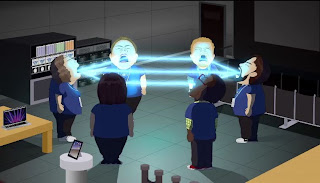By now you've caught on to my formula, I watch a South Park episode a couple times and post about it as soon as it becomes old. This week I'm determined to not get as huffy about my opinion as I did last week, but since this is a blog, you should know what you've signed up for since all good blogs are filled with personality. It's unfortunate that you guys are stuck with a high-horsed, cynical prick, but I'll try to be a studious, high-horsed, cynical prick. This time I'll talk about "T.M.I." where Cartman gets sent to anger management after all the boys penis sizes are posted on the schools bulletin board.
T.M.I is an obvious pun on the body mass index, or BMI, which South Park satirizes in it's own little way that we all love. While the BMI itself has gotten a large amount of press in America, the land of the obese, the BMI is fairly well known internationally. While humorous satire is lost when the episode is viewed out of context, it is still hilarious to watch grown men get uppity about the size of their wangs, a fairly universal obsession. Also on the end of the prodding stick are many, very American things that make little sense outside of context. Season 14's best episodes were very clear from the title what they satirized, "You Have 0 Friends", "It's a Jersey Thing", and "Insheeption" are all fan-favorites but they make a clear from the outset what they're making fun of and they spend their entirety on those topics. The oldest South Park episodes did not have this format, while some episodes were spent on one subject of satire, most simply told a funny, crass story about the civilians of South Park and littered the social commentary in the episode. A brief scroll through the Wikipedia page of South Park episodes shows that single topic satire episodes have become more common and are the majority of recent episodes. It is completely subjective which format is better, but all recent episodes have had either one or two topics that formed the broad focus of the satire.
 |
| Randy doesn't want a women telling him how to measure his junk |
While there is nothing wrong with this, it becomes a little formulaic to watch South Park constantly follow patterns like creating an episode where the norm is strange and the uncommon is the norm (See HUMANCENTiPAD). Another common pattern is the belittling of something through metaphor and then proceeding to make the intelligent metaphor as obvious as possible. It's a fairly obvious connection that cultures recent obsession with fitness and having a healthy weight is being compared to the male obsession with penis size; that is, illogical. After asking those in my loop who are big fans of the show why they enjoy it, the response is never for the intelligent social commentary. In fact to paraphrase a friend, the show is enjoyable because of poop and abortion jokes. Since South Park obtained most of its initial publicity from it's over-the-top, crass humor, it makes sense that true fans really want nothing more than what they came for, humor that pushes the envelope as far as possible. Matt Stone and Trey Parker, however, have made it clear that they do not like recycling material and when the envelope has fallen off the table it's difficult to continue pushing it. After 14 seasons of pushing the envelope Matt Stone and Trey Parker have started spending less time, or at least have had a harder time pleasing their perverted audience and has started playing to a much more mild one. Unfortunately, South Park has put its name in the books as a show that is not for those who are easily, or really difficultly, offended. The show is still not for that audience, but while the show has slowed the amount of crass humor, the audience has only marginally increased, which is probably a big part of why critical response to the show has been less positive as of late.




